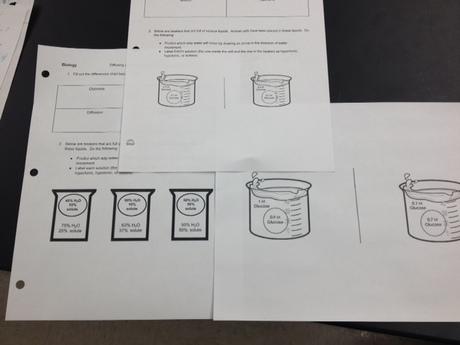You see, a lot of the students I have encountered this year have a firmly entrenched fixed mindset, mainly because they have a little trouble learning things and haven't realized that learning is about failing and getting better rather than getting it or not getting it. They seem wilted, defeated, assuming they can't before they've even begun. They've been taught school is about right and wrong, that it's about accuracy rather than effort. So, how do you teach students that learning is a journey, full of ups and downs and in-betweens and you have to work to learn rather than an all-or-nothing try once and if you don't get it you'll fail forever game? I don't know if there is one right answer to that crazily-worded question. But I can share with you what I've done, and it seems to be working.
Here's what I do: I look at student evidence of understanding. A lot.
I don't look at a lot of evidence a lot. I look at a little evidence a lot, looking at little pieces and glimpses of understanding aligned to my student objectives. And I give feedback on that evidence every single time. I make giving feedback a priority. For example, the exit slip/progress check I showed you in this post? I gave them a similar one 2 other times. That's right - three times I formatively assessed that I can statement, using similar yet different questions. And every time I scored (not graded-there is a difference) them and left feedback. Below is a picture of all of those formative assessments:
 By doing this, students can see their progress - they can see if they get better (or, in a few cases, if they get worse). They can see that they're growing, even if the growth curve has a few roller coaster dips and peaks in it. I have a student in my Biology classes who, at the start of the year, refused to attempt anything beyond her comfort zone out of fear of looking stupid. Now, she attempts (almost) every exit slip or progress check I give her. When I asked her what changed, she told me that she doesn't mind doing "my stupid stuff" anymore because, even though she scores poorly, she now knows what to do to fix it. Another student told me they liked it because he could see he was getting better - and he liked having chances to get better.
By doing this, students can see their progress - they can see if they get better (or, in a few cases, if they get worse). They can see that they're growing, even if the growth curve has a few roller coaster dips and peaks in it. I have a student in my Biology classes who, at the start of the year, refused to attempt anything beyond her comfort zone out of fear of looking stupid. Now, she attempts (almost) every exit slip or progress check I give her. When I asked her what changed, she told me that she doesn't mind doing "my stupid stuff" anymore because, even though she scores poorly, she now knows what to do to fix it. Another student told me they liked it because he could see he was getting better - and he liked having chances to get better. That right there makes all the time spent scoring worth it. Totally worth it.
Formative assessment helps grow a growth mindset. You might even say it's water for the mindsets that have wilted under the weight of the factory model of school. And, once students start soaking up all that formative assessment watery goodness, they start sprouting motivation and learning.
